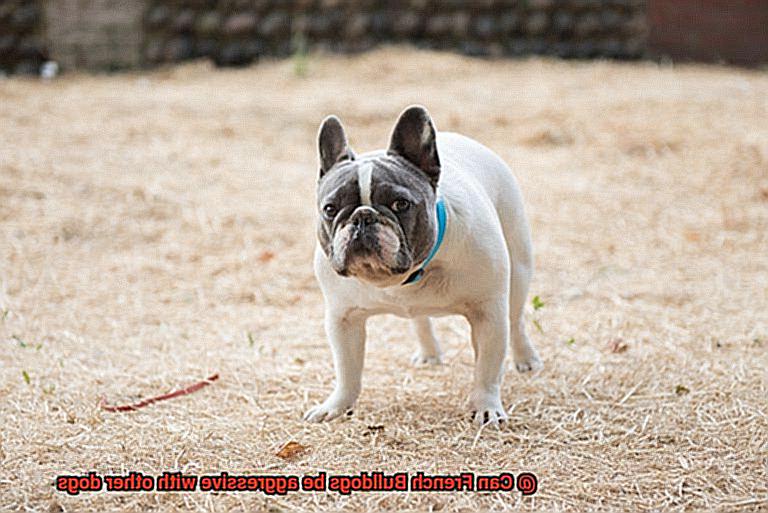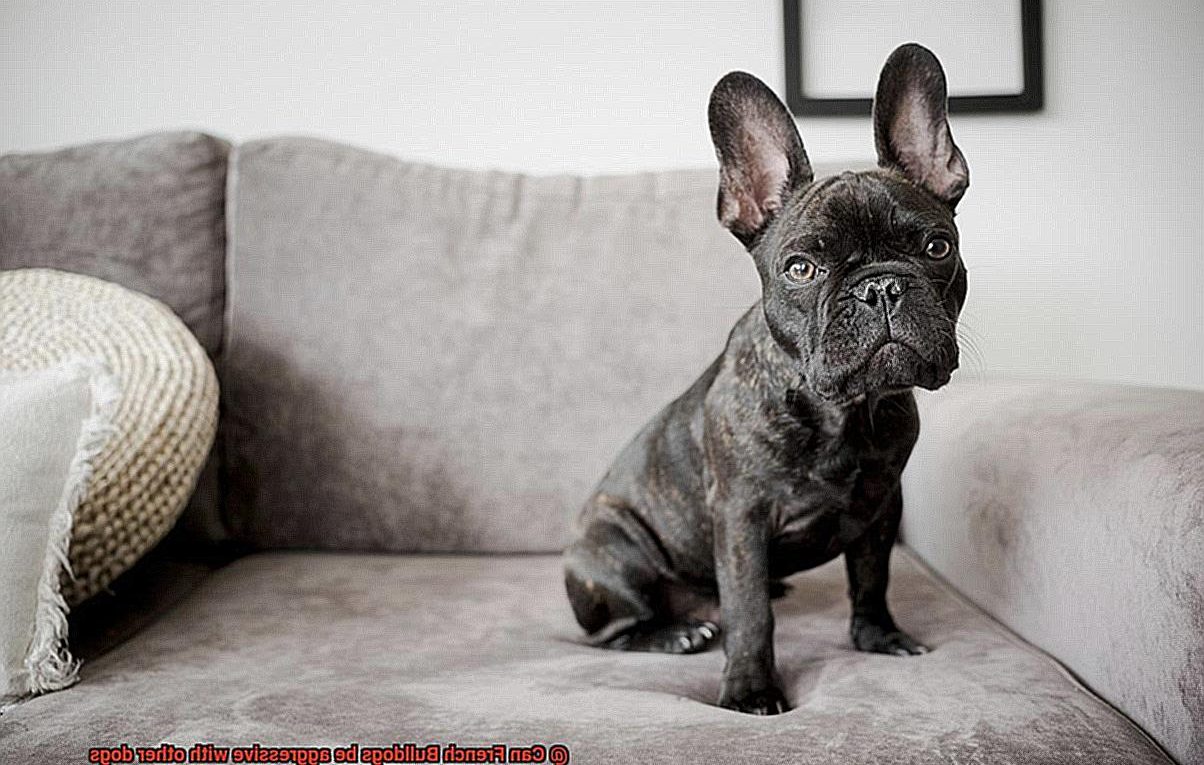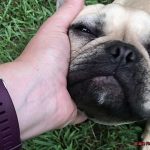Can French Bulldogs be aggressive with other dogs?
French Bulldogs, those adorable bundles of joy, have captured the hearts of dog lovers worldwide. Their lovable nature and affectionate personality make them a popular choice for many pet owners. However, like any breed, French Bulldogs have their own unique temperament traits that can sometimes lead to aggression towards other dogs.
In this blog post, we’ll dive into the potential for French Bulldogs to show aggression towards their furry counterparts. While it’s important to remember that each dog is an individual with their own quirks, understanding the factors that contribute to canine aggression is crucial for responsible pet ownership.
So, let’s explore the temperament tendencies of French Bulldogs and uncover the truth behind their potential aggression towards other dogs – debunking myths and shedding light on this issue. By gaining a deeper insight, we can arm ourselves with the knowledge needed to prevent or manage conflicts between our beloved French Bulldogs and their four-legged friends.
Join us on this informative journey as we peel back the layers and reveal the truth about French Bulldogs and their interactions with other dogs.
Is Aggression Common in French Bulldogs?
Contents
- 1 Is Aggression Common in French Bulldogs?
- 2 What Causes French Bulldog Aggression?
- 3 Signs of Aggression in French Bulldogs
- 4 How to Manage and Prevent French Bulldog Aggression
- 5 Socialization Strategies for French Bulldogs
- 6 Training Strategies for Reducing Aggressive Behavior in French Bulldogs
- 7 Exercise and Mental Stimulation for French Bulldogs
- 8 Professional Help for Dealing with French Bulldog Aggression
- 9 Conclusion

While aggression is not as common in French Bulldogs compared to some other breeds, it can still occur. In this article, we will explore the factors that contribute to aggression in French Bulldogs and provide tips and strategies for preventing and managing this behavior.
Factors Contributing to Aggression:
- Improper Socialization: Proper socialization plays a crucial role in preventing aggression in French Bulldogs. Early exposure to different people, animals, and environments helps them develop good social skills and reduces the likelihood of aggressive behavior towards other dogs.
- Fear and Anxiety: Like humans, dogs can experience fear and anxiety. If a French Bulldog feels threatened or scared, they may respond with aggression as a way to protect themselves. Understanding and addressing their fears can help reduce aggressive tendencies.
- Medical Issues: It’s important to note that aggression in French Bulldogs can also be influenced by underlying medical issues. Pain or discomfort caused by certain health conditions may make a dog more prone to aggressive behavior. Regular veterinary check-ups are essential to rule out any underlying medical causes.
Preventing and Managing Aggression:
- Positive Reinforcement Training: Training your French Bulldog using positive reinforcement methods is essential for preventing aggression. Rewarding good behavior with treats or praise reinforces appropriate behavior and helps them understand what is expected of them.
- Proper Handling: Consistent and gentle handling is crucial in preventing aggression. Avoid using force or punishment-based techniques, as these can escalate aggression. Instead, focus on building trust and reinforcing positive behaviors.
- Controlled Socialization: Providing controlled opportunities for socialization with other dogs is vital for French Bulldogs. Gradual introductions and supervised interactions allow them to learn proper canine communication and reduce the likelihood of aggressive responses.
- Spaying/Neutering: Consider spaying or neutering your French Bulldog, as it can help balance their hormonal levels and decrease territorial behaviors, which can contribute to aggression.
- Seek Professional Help: If your French Bulldog shows signs of aggression towards other dogs, it is essential to seek professional help from a certified dog trainer or behaviorist. They can assess the situation, identify underlying causes, and provide guidance on modifying the behavior using positive reinforcement techniques.
What Causes French Bulldog Aggression?
French Bulldogs are known for their charming and affectionate nature, but like any other breed, they can sometimes display aggression towards other dogs. Understanding the underlying causes of this behavior is crucial for effective management and creating a harmonious environment for your Frenchie. In this article, we will delve into the potential causes of French Bulldog aggression and provide insights on how to address them.
Lack of Socialization:
Proper socialization is vital during a French Bulldog’s early development stages. If your Frenchie has not been exposed to other dogs and unfamiliar situations, they may become fearful or defensive when encountering new dogs. This fear can manifest as aggression as a means of self-protection. Ensure your Frenchie is gradually introduced to different dogs and environments to foster positive social interactions.
Genetic Factors:
Genetics can play a role in a French Bulldog’s predisposition towards aggression. Breeding pairs should be carefully selected, avoiding dogs with a history of aggression. Responsible breeding practices can help minimize the risk of inherited aggressive tendencies.
Fear and Anxiety:
Fear and anxiety are common triggers for aggression in French Bulldogs. Creating a safe and secure environment, providing proper training, and socialization can help alleviate fear-based aggression. Seeking professional help, such as a certified dog trainer or behaviorist, can be beneficial in addressing fear-related aggression.
Resource Guarding:
Some French Bulldogs may exhibit aggression when it comes to protecting their resources, such as food, toys, or even their owners. Proper training and management techniques can help mitigate resource guarding behavior and promote a more peaceful coexistence with other dogs.
Medical Issues:
Undiagnosed medical problems can contribute to a dog’s irritability and aggressive responses. Regular veterinary check-ups are essential to identify any underlying health conditions that may be causing discomfort or pain, leading to aggression.
Improper Training and Handling:
Inconsistent or harsh training methods can create confusion and anxiety in French Bulldogs, which may manifest as aggression. Utilizing positive reinforcement techniques, such as rewards and praise, can help shape desirable behaviors and strengthen the bond between you and your Frenchie.
Signs of Aggression in French Bulldogs
French Bulldogs are beloved for their friendly and affectionate nature, but as with any dog breed, aggression can sometimes rear its head. It’s crucial for French Bulldog owners to recognize the signs of aggression in order to prevent potential issues and create a safe environment for their furry companions. In this article, we will explore the common signs of aggression in French Bulldogs, helping you better understand and address any aggressive behavior.
Growling: A Warning Sign
When a French Bulldog growls, it’s important to pay attention. This vocalization is a clear indication that your Frenchie feels threatened or uncomfortable. Responding promptly and appropriately can help prevent aggressive behavior from escalating.
Snarling and Baring Teeth: Defensive Posture
A snarl accompanied by bared teeth, raised hackles, and a fixed gaze is a warning sign that your French Bulldog may resort to biting if the situation escalates further. Recognizing these defensive behaviors is crucial in preventing any potential harm.
Lunging or Snapping at Other Dogs: Territorial Defense
French Bulldogs may display aggression when they feel threatened or territorial. Lunging or snapping at other dogs is a clear sign of this behavior. Swift intervention and separation from the triggering situation can prevent physical harm.
Excessive Barking or Growling at Other Dogs: Communication Gone Awry
While barking is instinctual for dogs, continuous and intense barking directed towards other dogs may indicate underlying aggression. Address this behavior through proper training and socialization to ensure peaceful interactions.
Resource Guarding: Possession Aggression
French Bulldogs may exhibit aggression when they become possessive over food, toys, or other valued items. Growling, snapping, or even biting may occur if someone attempts to take away their possessions. Proper training and management are essential to address this issue.
Fear-Based Aggression: Addressing Anxiety
Fear can trigger aggression in French Bulldogs, as it does in humans. Recognize signs of fear and create a safe and secure environment for your Frenchie. Positive reinforcement training can help them overcome their fears.
How to Manage and Prevent French Bulldog Aggression
French Bulldogs are adorable and lovable companions, but like any other breed, they can sometimes display aggression towards other dogs. However, with the right approach, aggression in French Bulldogs can be effectively managed and prevented. In this article, we will explore some useful tips and strategies to ensure a safe and harmonious relationship between your French Bulldog and other dogs.

Early Socialization:
Proper socialization is crucial in preventing aggression. Introduce your French Bulldog to various people, animals, and environments from a young age. Organize supervised playdates with well-behaved dogs and provide positive experiences. Puppy classes can also be a great way to expose your furry friend to new experiences in a controlled setting.
Positive Reinforcement Training:
Teach your French Bulldog basic obedience commands using positive reinforcement techniques. Reward good behavior with treats, praise, and playtime. This will help establish boundaries, reinforce your role as the pack leader, and redirect their focus away from potential triggers.
Consistency and Structure:
French Bulldogs thrive in a structured environment. Establish a routine for feeding, exercise, and playtime. Set clear boundaries and consistently reinforce them. By providing consistency and structure, you give your French Bulldog a sense of security, which can prevent frustration or anxiety that may lead to aggression.
Avoid Triggers:
Identify the triggers that may cause aggression in your French Bulldog and minimize exposure to them. For example, if your dog becomes anxious around certain types of dogs or in crowded places, avoid those situations until they are better equipped to handle them. Gradually introduce them to these triggers under controlled circumstances to build their confidence.
Seek Professional Help:
If your French Bulldog’s aggression persists or escalates despite your efforts, it may be beneficial to seek professional help. A certified dog trainer or behaviorist can assess the situation, identify the underlying causes of aggression, and provide personalized strategies to modify your dog’s behavior.
Socialization Strategies for French Bulldogs
French Bulldogs are known for their friendly and sociable nature, but like any other breed, they can display aggression towards other dogs if not properly socialized. To ensure your French Bulldog develops good behavior and manners around other dogs, it is crucial to implement effective socialization strategies. Here are some expert tips to help you socialize your French Bulldog effectively:
- Expose them to various environments and experiences: From a young age, expose your French Bulldog to different environments, people, and animals. Take them on walks in the neighborhood, visit parks, and introduce them to friendly dogs of various breeds and sizes. This exposure will help them become comfortable around all types of canines.
- Enroll in puppy classes or obedience training: Puppy classes or obedience training provide a controlled environment for your French Bulldog to interact with other dogs and learn proper social skills. These classes often incorporate positive reinforcement techniques and teach basic commands, making them an ideal setting for socialization.
- Use positive reinforcement: Positive reinforcement techniques such as treats, praise, and rewards are effective in encouraging good behavior during socialization sessions. Reward your French Bulldog whenever they display friendly and appropriate behavior towards other dogs.
- Gradually increase the difficulty level: Start socializing your French Bulldog in quieter settings and gradually increase the difficulty level by exposing them to busier places, crowded dog parks, or events where they can encounter multiple dogs at once. This gradual exposure helps them build confidence and adapt to different social situations.
- Monitor body language: It is important to monitor your French Bulldog’s body language during socialization sessions. Watch for signs of discomfort or aggression such as raised hackles, growling, or snapping. If they display these signs, remove them from the situation and try again later.
- Schedule regular playdates: Regularly schedule playdates with well-behaved and friendly dogs to provide ongoing socialization opportunities for your French Bulldog. These playdates allow them to practice their social skills in a controlled and supervised environment.
- Be consistent and patient: Consistency and patience are key when socializing a French Bulldog. It may take time for them to adjust and become comfortable around other dogs, so don’t rush the process. Continue providing positive experiences and reinforcement to reinforce good behavior.
- Seek professional guidance if needed: If you encounter difficulties in socializing your French Bulldog, seeking guidance from a professional dog trainer or behaviorist can be beneficial. They can offer personalized advice and techniques to address any specific challenges you may face.
Training Strategies for Reducing Aggressive Behavior in French Bulldogs
French Bulldogs can be prone to exhibiting aggressive behavior, but with the right training strategies, this behavior can be reduced and even eliminated. Here are some effective techniques to help owners address and manage aggression in their French Bulldogs:
- Socialization from a young age: Introduce your French Bulldog to various people, animals, and environments in a positive and controlled manner. This helps them become comfortable and confident in different situations, reducing the likelihood of aggressive behavior.
- Positive reinforcement training: Use reward-based training methods to reinforce desired behaviors and discourage aggressive ones. Reward your dog with treats, praise, or playtime when they exhibit calm and non-aggressive behavior. This helps them understand what is expected of them and encourages alternative behaviors to aggression.
- Consistency in rules and boundaries: Establish clear rules and expectations for your French Bulldog and consistently enforce them. This includes setting boundaries around appropriate behavior around other dogs. Reinforce positive behaviors consistently and redirect or ignore unwanted behaviors.
- Address underlying medical issues: Aggressive behavior can sometimes be a result of pain or discomfort. Regular veterinary check-ups are essential to address any medical issues that may be contributing to aggression. Consult with your vet if you suspect any medical conditions or medications affecting your dog’s behavior.
- Seek professional help: If you’re struggling with your French Bulldog’s aggressive behavior, consider seeking help from a certified dog trainer or behaviorist. They can assess the situation, identify triggers, and design a customized training plan to address the aggression effectively.
- Create a safe environment: Ensure your home or yard is secure to prevent escapes or encounters with other dogs that may trigger aggression. Supervise interactions with other dogs to prevent potential conflicts.
By implementing these training strategies and providing a nurturing and structured environment, you can effectively reduce aggressive behavior in your French Bulldog and promote harmonious interactions with other dogs.
Exercise and Mental Stimulation for French Bulldogs
French Bulldogs are known for their energetic and playful nature, but sometimes this exuberance can tip over into aggression towards other dogs. However, with the right mix of exercise and mental stimulation, this unwanted behavior can be significantly reduced. Let’s explore how these activities can help in taming the fiery temperament of French Bulldogs.
Get Moving with Daily Walks
One of the best ways to ensure that your French Bulldog remains well-behaved and friendly towards other dogs is to provide them with regular exercise. Daily walks are an excellent form of exercise for French Bulldogs. Aim for at least 30 minutes to an hour of walking per day, depending on your dog’s age and fitness level. Not only does this help maintain their physical health, but it also allows them to explore their surroundings and socialize with other dogs they may encounter along the way.
Playful Minds, Happy Dogs
In addition to walks, interactive play sessions are crucial for mental stimulation and bonding with your French Bulldog. Engaging in activities such as fetch, tug-of-war, or puzzle toys can keep their minds sharp and prevent boredom, which can lead to behavioral issues like aggression. These activities also provide an outlet for their natural instincts and help channel their energy in a positive way.
Channel Their Inner Athlete
Participating in canine sports or training classes can provide additional mental stimulation for French Bulldogs. These activities not only challenge their problem-solving skills but also promote socialization with other dogs. Through these interactions, French Bulldogs can learn appropriate play behavior and develop positive associations with their canine counterparts.
Socialization: The Key Ingredient
While exercise is important, it is equally crucial to expose your French Bulldog to various environments, people, and other dogs from an early age. This helps them become more comfortable and confident in different situations. Puppy socialization classes, regular visits to dog-friendly parks, or arranging playdates with other well-behaved dogs can all contribute to positive socialization experiences.
Remember, exercise and mental stimulation alone may not completely eliminate the possibility of aggression towards other dogs. It’s essential to seek professional guidance if aggression issues arise despite your efforts. With proper exercise, mental stimulation, and socialization, you can help your French Bulldog become a well-rounded and friendly companion.
Professional Help for Dealing with French Bulldog Aggression
Why Professional Help is Essential for Dealing with French Bulldog Aggression
Dealing with aggression in French Bulldogs can be a challenging and potentially dangerous situation. While exercise and mental stimulation are important aspects of managing their fiery temperament, seeking professional help is crucial for addressing aggression effectively. Here’s why:
- Expert Assessment: Aggression in dogs is often complex and multifaceted, requiring a thorough understanding of their behavior and underlying causes. Certified dog trainers and behaviorists specialize in identifying these factors and developing customized training plans to address them. Their expertise ensures that the root of aggression is properly identified and treated.
- Tailored Approach: French Bulldogs have unique traits and characteristics that require a specific approach to training. It’s essential to find a professional who has experience working with this breed and understands their quirks. A tailored training plan will maximize effectiveness and give you the best chance of success in curbing aggression.
- Medical Evaluation: Aggression can sometimes stem from underlying medical conditions or pain. Consulting with a veterinarian is crucial to rule out any physical issues before addressing the behavioral problem. They can conduct a thorough examination and recommend appropriate medical interventions if necessary.
- Medication Management: In some cases, medication may be prescribed by a veterinarian to help manage aggression. Medication can assist in reducing anxiety or aggression levels, but it should always be used in conjunction with behavior modification techniques under professional guidance.
- Support and Guidance: Joining support groups or online communities dedicated to French Bulldog owners can provide valuable advice and personal experiences from individuals who have dealt with similar aggression issues. However, it’s important to remember that each dog is unique, so seeking professional guidance alongside these resources is essential.
- Consistency and Patience: Addressing aggression requires time, consistency, and patience. Setbacks may occur along the way, but remaining dedicated to the process and seeking ongoing professional help will increase your chances of success.
EvweYG93oF0″ >
Conclusion
In conclusion, it is important to recognize that French Bulldogs have the potential to display aggression towards other dogs.
While they are generally known for their friendly and sociable nature, certain factors can contribute to aggressive behavior. It is crucial for owners to understand their dog’s individual temperament and provide proper training and socialization from an early age.
Additionally, responsible ownership includes closely monitoring interactions with other dogs and intervening when necessary to prevent any potential conflicts.




